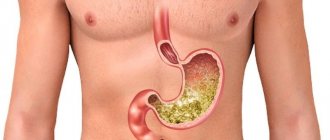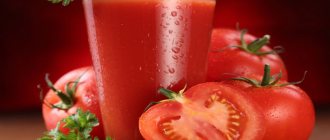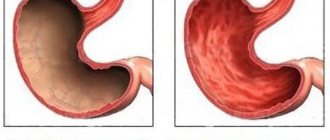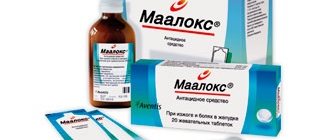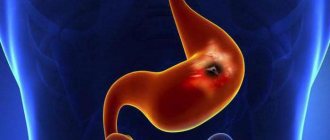Zero acidity of the stomach is a pathological process that is caused by certain etiological factors and leads to disruption of the natural process of acid production in the mucous membrane of the organ. The development of such a disease leads to the penetration of pathogenic organisms into the mucous membranes of the gastrointestinal tract, which ultimately leads to inflammatory processes in the intestines. In addition, with zero acidity in the stomach, proteins are poorly digested, which also leads to extremely negative consequences - cancer processes and intoxication of the body.
When this pathological process manifests itself, you should immediately seek medical help, and not carry out therapeutic measures at your own discretion. In most cases, conservative therapy with a mandatory diet takes place.
Etiology
The cause of this pathological process may be the following factors:
- a history of infectious diseases;
- acute gastritis;
- dysentery;
- poor nutrition, which consists of abuse of fast food, dry food, snacks on the go;
- abuse of alcoholic beverages and surrogates;
- prolonged fasting or following a diet that is unsuitable for the body;
- passive lifestyle;
- lack of physical activity;
- long-term treatment or uncontrolled use of medications;
- frequent food poisoning.
It should also be understood that none of the above etiological factors is a 100% predisposition to the development of such a pathological process, but under certain factors it can become the main cause.
Zero acidity in the stomach leads to slow digestion. In addition, in people with this pathological process, atrophy of the mucous membrane begins, which leads to disruption of the production of gastric juice.
Pathogenesis
The level of acidity is an important indicator on which the digestive process depends. The main component of gastric juice is hydrochloric acid, which is present in various parts of the gastrointestinal tract. Its concentration should be different in all zones.
Acidity can be normal, low or high. Zero coefficient is the lowest limit of acidity.
Do not self-medicate under any circumstances, otherwise the recovery process will be long and extremely painful. Hydrochloric acid plays the role of an indicator of the acidity of gastric juice. When it is at zero, proper disinfection of the food mass does not occur. This disrupts the intestinal microflora and also provokes the active proliferation of pathogenic microorganisms.
The main clinical picture with zero acidity of gastric secretion:
- frequent constipation is observed. Due to reduced intestinal motility, food debris is not able to be evacuated quickly and completely;
- release of toxins, causing discomfort and pain, especially after eating;
- lack of appetite;
- metallic taste in the mouth;
- bad breath caused by rotting food;
- a peculiar viscosity prevails in the oral cavity due to the restructuring of the saliva structure;
If there is pain, fever and nausea, then the pathology has worsened and spread. Having discovered the listed signs, you should consult a doctor to begin direct treatment of the disease.
Symptoms
The clinical picture of this pathological process at the initial stage of development can be asymptomatic. As the disease worsens, the following symptoms may appear:
- pain and discomfort in the epigastric region, unpleasant sensations can radiate to the back;
- heaviness in the stomach;
- belching with an unpleasant odor;
- heartburn;
- bad breath;
- metallic taste in the mouth;
- prolonged constipation. The stool may contain mucus and undigested pieces of food;
- nausea, which is often accompanied by vomiting. Vomit may contain mucus, bile, and blood impurities;
- sudden weight loss accompanied by frequent vomiting and diarrhea, loss of appetite;
- abdominal pain, which is most often localized in the abdominal cavity;
- bloating, increased flatulence;
Against the background of such a clinical picture, an exacerbation of existing diseases or the development of pancreatitis, cholecystitis and other gastroenterological ailments with a similar etiology may be observed.
These clinical manifestations are the main predisposition for a visit to a gastroenterologist. Consultation with other specialists may be necessary.
Symptoms
If the acidity level is zero, the patient may be bothered by the following symptoms:
- Regular constipation. Problems with stool increase along with a decrease in acidity levels. This is due to a malfunction of the intestines, when food debris is not able to be eliminated normally and quickly from the body.
- Pain and discomfort after eating food. These symptoms occur as a result of undigested food residues in the stomach, which provoke the release of toxins.
- Unpleasant odor from the mouth. When acidity is “0”, a specific odor appears in the mouth, which is difficult to get rid of. It occurs as a result of insufficiently disinfected food in the intestines, where it begins to rot. The smell progresses and becomes more pronounced along with the disease, which cannot be treated.
- Decreased appetite and metallic taste in the mouth. Zero acidity is caused by a reluctance to eat food and the presence of severe heaviness in the stomach. In some cases, painful sensations in the pit of the stomach may occur.
- Viscosity in the mouth. This sensation interferes with normal speech and is associated with a structural change in saliva.
- Increased body temperature, general deterioration of health and nausea. If the patient is bothered by these symptoms, he should immediately consult a doctor, as gastritis has become severe.
Return to contents
Diagnostics
First of all, a gastroenterologist examines the patient, during which he must establish the following:
- how long ago and under what circumstances the first symptoms began to appear;
- what additional signs are present;
- how the patient eats, whether he takes any medications on an ongoing basis;
- Do you have a history of chronic gastrointestinal diseases or food allergies?
It should be noted that in addition to consulting a gastroenterologist, you may need to be examined by an infectious disease specialist and an allergist.
To clarify the diagnosis and identify the etiology, the following laboratory and instrumental research methods may also be prescribed:
- general clinical analysis of blood and urine;
- general analysis of stool;
- coprogram;
- X-ray with contrast agent;
- fibrogastroscopy;
- biopsy of the gastric mucosa;
- bacteriological analysis of stomach contents;
- PCR test;
- intragastric pH-metry.
Data from the examination results make it possible to establish the cause of the development of such a pathological process and, based on this, establish the most effective treatment tactics.
Disease prevention
Increased stomach acidity is not a rare occurrence.
To conclude today’s material, let’s pay attention to how to prevent an increase in acidity after its therapy or if you have a predisposition to this disease. In general, the prevention of pathology is as follows:
- Organize proper nutrition in moderation. That is, it is not necessary to give up all sorts of goodies such as hamburgers or chocolate, but it is necessary to control their consumption.
- Eat small meals. Ideally, meals during the day will be divided into 5-7 pieces.
- After eating, do not overexert yourself and do not lie down on the sofa. Let the food “settle” in your stomach and only then begin to lie down or engage in physical activity.
- Maintain your weight within normal limits. If you have too much, be sure to lose it, otherwise problems with the gastrointestinal tract will not bypass you.
- Quit smoking. This, by the way, is mandatory, since smoke reaching the gastric mucosa has a negative effect on it, increasing the secretion of gastric juice, which is simply unacceptable if the stomach has high acidity.
- Don't abuse alcohol. Here, perhaps, everything is extremely simple and clear.
- Do not wear clothes that tightly compress the abdominal area. This manner of dressing can disrupt the digestion process even in a completely healthy person, which should not be forgotten.
- Try to avoid stress, nervous shock and depression. They often influence the development of disorders in the gastrointestinal tract. Therefore, it is advisable for every person suffering or predisposed to stomach ailments to take care of a consistently normal psycho-emotional state.
In general, the most important information on nutrition, therapy and prevention of high stomach acidity has come to an end. We hope that the material presented today was useful to you and provided answers to your questions. Good health to you!
What causes gastritis with low acid secretion? There are many possible causes that are causative factors for inflammation of the stomach wall.
The most significant risk factor for low-acid gastritis is prolonged and excessive consumption of non-steroidal anti-inflammatory medications or medications containing Ibuprofen or Aspirin.
Excessive alcohol consumption, stressful situations and the penetration of bacterial agents into the body can similarly cause gastritis with low levels of acid secretion.
Symptoms of the disease vary and include abdominal pain, flatulence, indigestion, loss of appetite, post-meal stomach cramps and vomiting.
These are the symptoms that usually appear in patients suffering from this disease.
Low acid gastritis is diagnosed after several medical examinations and a review of the patient's and family's medical history.
Blood tests, upper endoscopy, stool analysis and other tests may also be performed.
After a proper medical examination and a course of medication, your doctor or nutritionist can suggest a healthy eating plan that will alleviate any further problems caused by low acid gastritis.
Treatment
In most cases, treatment of zero stomach acidity is carried out using conservative methods, however, it should be noted that this disease cannot be completely eliminated. The issue of hospitalization is decided on an individual basis.
Drug treatment may consist of taking the following drugs:
- enzymes;
- prokinetics;
- antispasmodics;
- hydrochloric acid preparations;
- to improve gastric motility;
- antiemetics to prevent dehydration.
A mandatory component is dietary nutrition. A diet with zero stomach acidity prohibits the consumption of the following foods:
- fatty, salty, spicy, smoked;
- butter;
- foods that cause fermentation in the stomach;
- marinades;
- fresh bakery;
- sauces, including mayonnaise;
- hard-boiled eggs;
- legumes and mushrooms;
- raw vegetables;
- fruits and berries without heat treatment and with seeds;
- radish, onion, garlic, pepper, sorrel;
- chocolate, ice cream and similar confectionery products;
- strong tea and coffee, cocoa;
- sweet carbonated drinks;
- alcohol.
The patient's diet should be based on the following foods:
- thermally processed vegetables, fruits, berries. The best option would be to prepare casseroles, jellies, and soufflés from them;
- lean poultry and fish;
- soaked herring;
- doctor's or milk boiled sausage, low-fat ham;
- yesterday's wheat bread and similar bakery products;
- water- or milk-based porridge (only wheat and pearl barley are prohibited);
- fermented milk products, but subject to good tolerance and no more than 15 grams per day;
- steam omelettes and soft-boiled eggs;
- parsley, dill, fresh or dried, as an addition to dishes;
- vegetable oil;
- tea with milk, rosehip or blackcurrant decoction. It is not prohibited to add a small amount of honey; it is better to avoid sugar.
Treatment of high stomach acidity
A special diet will help get rid of this disease.
The process of treating high acidity of the gastrointestinal tract consists of organizing the following activities:
- Relief of unpleasant symptoms.
- Determining the exact cause of the development of pathology.
- Organization of treatment.
- Maintaining a healthy state.
As you can see, it is possible to organize therapy for high acidity only on the condition that the exact cause of its occurrence is known. And it seems possible to find out only after undergoing appropriate examinations at the clinic.
Let's say you visited a gastroenterologist and the cause of the disease is known. What to do next? Naturally, start getting rid of high stomach acidity. In general, the process of such therapy consists of meeting two mandatory conditions:
- Reducing acidity through specialized drugs.
- Organization of a special diet.
We’ll talk about proper nutrition for high stomach acidity in the next paragraph of the article. Now we will consider in detail the medications for the treatment of this pathology. In a typical treatment option for an illness, their list is as follows:
- Medicines to relieve symptoms. This group of drugs will reduce abdominal pain, heartburn and other signs of pathology. Among them, it is worth highlighting Rennie, Gastal and Adzhiflux.
- When the gastrointestinal tract is affected by the Helicobacter pylori bacterium, antibacterial drugs are used, among which De-Nol is often used.
- For general stomach problems and high acidity, histamine receptor blockers and hydrochloric acid synthesis blockers are used. In the group of these medications, Kvamatel and Omez stand out.
- If necessary, “protectors” of the stomach walls from inflammation can be used, for example, Almogel.
The list of medications presented above is only a general order. Depending on the specific characteristics of each case, it may be supplemented with other drugs. And in some cases, even surgical intervention cannot be avoided.
You will learn about the causes and consequences of heartburn from the video:
Prevention
It is impossible to completely exclude the development of this pathological process, but you can minimize the risk of development if you apply the following in practice:
- monitor your diet - it should be balanced for the body, food should be consumed in a timely manner and in a calm environment;
- gastroenterological diseases need to be treated correctly and in a timely manner - this will help to avoid associated complications;
- If possible, you need to protect yourself from stress and psycho-emotional stress.
In addition, it is rational to systematically carry out preventive examinations with a gastroenterologist and other highly qualified medical specialists. Such measures will help to diagnose the disease in a timely manner or prevent its development altogether.
Normally, in a healthy person, gastric juice has a strongly acidic reaction. An acidic environment in the stomach is necessary, firstly, for the normal process of food digestion, in particular for the complete breakdown of proteins. On the other hand, the aggressive (acidic) environment in the stomach is a kind of antibacterial filter that does not allow many microorganisms to penetrate the mucous membranes of the gastrointestinal tract and further spread throughout the body.
For one reason or another, the acidity of gastric juice can change, both upward and downward. In some cases, we are talking about zero acidity - a pathological condition that occurs as a result of a disruption of the normal mechanism of acid formation in the gastric mucosa.
Zero acidity of the stomach promotes the penetration of pathogenic microorganisms into the mucous membranes of the gastrointestinal tract, which contributes to the development of the inflammatory process, which in turn disrupts intestinal motility, leading to constipation.
With zero acidity in the stomach, proteins are poorly digested, which can lead to intoxication of the body and the development of tumor processes.
occupies a special place in the treatment of zero stomach acidity . You should approach nutrition responsibly, not allowing yourself foods and dishes that can be harmful.
What can you eat if you have zero stomach acidity?
If the stomach acidity is zero, it is allowed to consume foods of varying degrees of heat treatment and grinding. These can be boiled, baked or stewed dishes. Occasionally you can allow fried foods, but without a rough crust. Do not use breadcrumbs or flour for frying.
At zero acidity, the following products are allowed:
- stale (yesterday's) wheat bread, flour products from uneaten dough with boiled meat, eggs, rice, cottage cheese, apple;
- lean meats (beef, rabbit, veal, poultry), lean fish (pike perch, hake, perch, cod, navaga). Meat and fish should be consumed boiled, baked or stewed. It is also allowed to eat low-fat ham, soaked herring, doctor's sausage and milk sausage;
- soups cooked in low-fat meat or fish broth. Soups can be with cereals (except millet), potatoes, noodles, zucchini, carrots, cauliflower, pumpkin;
- vegetables (carrots, zucchini, pumpkin, potatoes). If digestibility is good, white cabbage, young beans, green peas, and beets are allowed. Vegetables can be consumed boiled, baked or stewed;
- porridge (except pearl barley and millet) in water with the addition of 1/3 of the volume of milk. Boiled noodles and puddings (steamed or baked) are also allowed;
- baked apples and pears. Fruits and berries are allowed in the form of jelly, compotes, jam, preserves or jelly. Strawberries, strawberries, raspberries, apples and pears without peel are allowed to be consumed raw. You can also drink freshly prepared juices (apple, strawberry and cherry);
- soft-boiled eggs, omelettes (steamed, baked, fried);
- fermented milk products, cottage cheese, cheesecakes, casseroles, mild cheeses, sour cream (up to 15 g per day). If tolerated well, whole milk can be allowed in dishes;
- greens (parsley, dill), bay leaf (a little), cloves, vanilla;
- tea, coffee with milk, decoctions of black currant and rose hips;
- vegetable and butter (rarely) in dishes.
Alkaline diet
If you have increased stomach acidity, you should consult a doctor so that he can establish a diagnosis and determine drug treatment.
You can reduce the level of stomach acidity with the help of drugs such as Gastal, Almagel, Maalox.
But problems with high acidity can be solved with diet.
Stomach acidity with gastritis requires following a few simple rules:
- The temperature of the cooked dish should be exactly the same as the human body. You cannot eat hot or cold foods.
- You can't overeat.
- It is very important to chew your food thoroughly.
- If you have high stomach acidity, you need to take foods and dishes fresh, without adding preservatives or various seasonings.
- In order to reduce the effect of hydrochloric acid during gastritis, it is necessary to take mucous soups and cereals. This is necessary in order to envelop the walls of the stomach. It is ideal to eat oatmeal, semolina and rice porridge.
- The acidity of the milk helps a lot. You can eat low-fat cottage cheese, yogurt, cheese.
- Green tea or plain water are suitable drinks. It is necessary to drink water without carbon, but preferably with the addition of soda. But, such treatment should be taken very limitedly, because baking soda can gradually cause stomach ulcers.
You need to know what foods you should avoid in order to normalize the level of stomach acidity. You should avoid fried foods, spicy marinades, and rich broths.
Vegetables and fruits that contain large amounts of fiber are not suitable. You can drink green tea, herbal tinctures, sea buckthorn oil and cinnamon.
The easiest way to reduce acidity
You don't need any knowledge for this. You just need to crush a teaspoon of baking soda in a glass of warm water. A good helper if the acidity is high, then white clay or chalk powder can serve.
The best helpers in this case can be potatoes and carrots. For dessert they can have red beets and pumpkin. They can be boiled, cooked in the oven or in a slow cooker. Thus, they retain the necessary vitamins.
What happens in the body at zero acidity
In order to understand the mechanism of the occurrence and development of this disease, it is necessary to understand what happens in the body when the acidity of the stomach decreases, what this indicator should be normally, and what is affected by its change.
The acidity of digestive juice shows how much HCl (hydrochloric acid) is contained in a given physiological fluid; this value is measured in pH units. This indicator is usually measured on an empty stomach and is normally 1.6 – 2 pH. It is this acidity that allows the stomach to cope with all its functions.
Hydrochloric acid is produced by special cells of the gastric mucosa - parietal cells, which are contained in the fundic glands. This acid not only participates in the digestion of food, but also activates other substances necessary for its absorption - proteolytic enzymes, including pepsin. If the amount of these substances is insufficient or they are not active, then the process of protein breakdown, which normally begins in the stomach, becomes impossible, which leads to fermentation. And this causes the accumulation of gases, bloating, and intoxication of the body with decay products. In addition, the biocenosis (constancy of microflora) of the intestines suffers, which over time leads to dysbacteriosis.
If we describe all the changes in the digestive tract caused by the neutral environment of gastric juice in simple words, then the stomach turns into a “muscular bag” in which incoming food is stored until it passes into the intestines.
Symptoms of the disease
Increased stomach acidity is accompanied by pain in the abdominal area.
Increased stomach acidity is an ailment that has a huge number of symptoms. Typically, the symptoms of the pathology are limited to:
- pain of varying severity in the abdominal area, intensifying after eating after 2-3 hours;
- severe burning behind the sternum, otherwise heartburn;
- sour belching and unpleasant taste in the mouth;
- nausea and vomiting;
- intestinal colic and increased constipation;
- the presence of a grayish-white coating on the tongue;
- increased drowsiness and fatigue.
At first, you can stop such symptoms without even thinking about it, but if its manifestations are systematic, then you should think about visiting the clinic. Remember that a professional gastroenterologist and special examinations will allow you not only to diagnose the pathology, but also to organize its correct treatment.
In the case of high stomach acidity, this is quite important.
What are the dangers of zero acidity?
The sooner you recognize the problem and begin to eliminate it, the less damage it will cause to your body, because zero stomach acidity can lead to serious complications, including:
- digestive disorders;
- various inflammatory pathologies of the stomach and intestines (gastroduodenitis, gastritis, etc.);
- peptic ulcer;
- dysbacteriosis, development of intestinal infections;
- cancer.
Therefore, let's take a closer look at the earliest manifestations of this condition.
Useful video
Growing up is not only a great opportunity for various opportunities, but also the period when the first health problems appear. Considering the methods and quality of modern nutrition, the increase in problems with the gastrointestinal tract among representatives of humanity is not particularly surprising.
One of the typical pathologies of this part of the body is increased acidity of the stomach. We will talk about what this disease is, how to treat it and eat properly in case of pathology in the material presented below.
What changes in the body should be adjusted
In order to prevent complications, it is enough to promptly suspect a violation of the level of activity of digestive juice and contact a gastroenterologist. What “bells” should alert you:
- Frequent constipation.
- Decreased appetite and unexplained weight loss.
- Rotten breath (halitosis).
- Flatulence.
- Belching after eating.
- Heaviness in the pit of the stomach.
- Dull pain in the stomach.
All these signs may indicate that the acidity of gastric juice is reduced down to “zero” levels. As a result, not only is the process of digesting food and assimilation of vital substances disrupted, but also the resistance of the gastrointestinal tract to bacterial agents is reduced.
A timely visit to a gastroenterologist will help maintain the health of not only the stomach, but also the entire body as a whole. Do not self-medicate – entrust the care of your health to specialists!
Why does it happen?
What results in zero acidity of gastric juice? The question is of interest to those who have encountered anacid gastritis at least once in their lives. The following factors contribute to the appearance of low acidity:
- violations of diet and diet balance;
- frequent nervous strain and stressful situations negatively affect the production of hydrochloric acid in the digestive juice;
- genetic predisposition;
- malignant neoplasms in the stomach that affect acid-producing cells;
- chronic gastritis, in which cell death occurs and acidity levels decrease.
Drug therapy
When there is zero acidity in the stomach, a number of drugs are prescribed, among which most often are:
- Replacement therapy drugs, that is, containing hydrochloric acid (Pepsidil, Trienzyme, etc.) help to establish the process of breaking down food components.
- Enzyme-containing drugs (Acepepsol, Pentamin). Their main task is to normalize digestion.
- Probiotics and eubiotics (Profibor, Linex, Duphalac, dry starter cultures from live cultures, etc.) help restore the quantitative and qualitative composition of the microflora in the intestines, as well as increase the patient’s local and general immunity.
- Laxatives are prescribed in case of persistent constipation (Guttalax, Fitomucil, Senade, Glycerin suppositories, Microlax, etc.)/
Only a doctor can prescribe the correct drug treatment, because you need to take into account not only the nature of the disease, but also concomitant diseases, age, weight and other criteria!
Traditional medicine
Traditional medicine also offers recipes that help normalize the level of acidity in the stomach. Of course, if the disease is protracted, then they are unlikely to be able to completely replace enzymatic therapy, but in the early stages of the development of such gastritis, recipes based on natural ingredients will be able to cope with the problem.
If the acidity level is low, you can use plantain juice. This is the simplest remedy. To prepare it, you should collect the leaves of the plant, wash them thoroughly, and then use a juicer. You can simply rub the leaves through a meat grinder and then squeeze out the juice through cheesecloth. You should drink this liquid every time before meals. By the way, plantain leaves can be added to various salads. This will only improve the patient’s well-being within a couple of days.
Every day you should drink a glass of warm water, in which a spoonful of honey is pre-mixed. This not only has a beneficial effect on the functioning of the stomach, but also helps better digestion. The drink should be consumed 30 minutes before meals. You can brew dry raspberry leaves, viburnum, rose hips, and aloe.
Traditional medicine recipes
Properly selected traditional medicine recipes can increase acidity from zero to normal and maintain it at this level. However, you should not count on a quick effect from their use, because the results of such therapy usually become noticeable after 6 or more months.
The most popular are the following recipes:
- Plantain juice with honey. Collect fresh leaves of the plant, wash them thoroughly or scald them with boiling water, squeeze out the juice. Add natural honey to the resulting liquid at the rate of 20 ml of honey per 50 ml of liquid. Take half an hour before meals.
- Take rosehip, viburnum and raspberry leaves in equal parts, leave 25 g of the mixture in 50 ml of boiling water for half an hour. The infusion is an excellent replacement for tea, which should be drunk 20 minutes before meals.
- Cut off the lower leaves of the aloe (the plant should be older than 3, or preferably 5 years), wrap in foil and leave in the refrigerator for 2 weeks. Grind them to a paste and mix with honey in equal proportions. 15 minutes before your meal, eat a teaspoon of the resulting product, and you will be healthy.
If the treatment does not bring the expected effect, try using a different recipe. Each body is individual, and what helps one person may not be useful for another.
Features of the treatment of anacid gastritis
To prevent the pathology from becoming acute, it is important to start treatment in a timely manner. Despite the fact that existing treatment methods do not guarantee a 100% recovery, it is possible to maintain normal health without allowing the situation to worsen. The main principle of therapy is to replenish the deficiency of hydrochloric acid with the help of replacement agents.
The optimal method of treatment is the use of appropriate medications that affect the mechanisms of hydrochloric acid production. It is also important to pay due attention to the course of rehabilitation and preventive measures. Basically, medications with artificial enzymes are used - Mezim, Festal, which help improve the process of digesting food, as well as the subsequent absorption of nutrients.
It is strictly forbidden to ignore such a condition. Otherwise, anacid gastritis will acquire a chronic form that is difficult to treat. The gastroenterologist prescribes diet therapy, which plays an important role in the therapeutic course. It is also necessary to lead an active, healthy lifestyle. An excellent choice of therapy is spa treatment.
As for traditional medicine, it provides a number of effective recipes that help normalize the concentration of hydrochloric acid in the stomach. As a rule, such therapy is used at the early stage of gastritis. If intense symptoms are observed, medication is required.
For zero acidity, plantain juice is used. This remedy is considered one of the most affordable. To prepare it, you need to take 4 plantain leaves, wash them thoroughly and pass through a meat grinder. The squeezed juice is consumed before meals. Experts recommend adding plantain leaves to various salads and dishes. Improvement in well-being is felt after a few days.
Drink 250 milliliters of warm water daily with the addition of a teaspoon of natural flower honey. This method helps to normalize the activity of the gastrointestinal tract, and also significantly improves the digestion process. The honey drink is taken half an hour before meals.
Only the attending physician should select a course of treatment for anacid gastritis. With the help of proper therapy, you can quickly relieve symptoms, relieve exacerbation and restore the functioning of the gastrointestinal tract. To avoid exacerbations, during the period of remission it is necessary to adhere to the principles of therapeutic nutrition.
Treatment for zero stomach acidity is prescribed only by a doctor. It is imperative to start treatment as early as possible, because... this pathological phenomenon has serious consequences. Zero acidity of gastric juice is considered a fairly common pathology, especially in modern conditions and the fast pace of life. This phenomenon is also known as "anacidic gastritis".
The acidity level of juice in the stomach is an important indicator. It is he who is responsible for the normal digestion of food coma. The main component responsible for acidity is hydrochloric acid. It is found in different parts of the intestines and stomach, and the level of its acidity in all zones should be different. In addition, the acidity in the stomach may be excessively high or low. The zero coefficient is the lower limit of acidity when the value can no longer fall below.
Therapeutic diet
A diet with zero stomach acidity is important because it allows you to overload the digestive tract with harmful and poorly digestible food.
The list of permitted products is diverse enough to create a complete daily menu:
- dishes based on lean fish and meat;
- baked and boiled vegetables (potatoes, carrots, tomatoes, zucchini, pumpkin, cauliflower, eggplant);
- non-acidic berries and fruits (pears, plums, apples, apricots, peaches, strawberries, etc.) can be eaten raw and used in making desserts;
- oatmeal, buckwheat, rice, barley, millet porridge;
- pasta;
- dairy products;
- drinks (herbal teas, non-sour fruit drinks and juices, jelly, compotes).
It is important not only to eat a healthy diet, but also to follow some recommendations:
- Always chew your food thoroughly, this will make it easier for your stomach to digest it, and the walls will be less damaged.
- It is advisable to avoid hot and cold foods; it is better if the food is at room temperature.
- Avoid fatty, salty, fried, smoked foods and all types of preserves.
- Be sure to follow a dietary regime - eat at the same time.
- Single portions of food should be small.
By adhering to these simple rules and eating approved foods, you will significantly “make life easier” for your stomach and help it recover as quickly as possible.
Diet
With anacid gastritis, dietary nutrition does not prohibit the consumption of dishes prepared using various heat treatments. Food products may be baked, boiled or stewed. As a last resort, you can fry, but without bringing it to a rough crust and without using flour or breadcrumbs. Thus, the following list of products is allowed:
- non-rich broths made from lean meat or fish, with the addition of cereals, noodles, potatoes and vegetables;
- yesterday's white bread;
- lean meat and fish that can be boiled, stewed or baked;
- milk sausage and unsalted herring may also be present in the diet of a patient with a zero acidity level;
- zucchini, potatoes, pumpkin and carrots, boiled or baked, are allowed for anacid gastritis;
- buckwheat, rice, semolina and other types of porridges, except millet or pearl barley, cooked in water with the addition of a third of milk;
- baked apples;
- jelly, compotes, preserves and jams from various berries and fruits;
- raw raspberries, wild strawberries and strawberries, as well as peeled apples and pears;
- steamed or fried omelettes and soft-boiled eggs;
- weak tea, coffee with milk and currant infusions;
- fermented milk products and dishes made from them;
- butter, sunflower, olive oils.
The following foods should be absent from the therapeutic diet:
- mayonnaise, store-bought ketchup and other sauces;
- legumes;
- fish and meat of fatty varieties;
- hard-boiled eggs;
- canned food and smoked products;
- raw vegetables, fruits and berries;
- chocolate;
- pickled vegetables;
- over-salted dishes;
- cucumbers, onions, mushrooms, garlic and sweet peppers.
If a patient has been diagnosed with acidity tending to zero, then he needs to adhere to a diet that consists of eating food in small portions. It is important that after a meal a person does not feel heaviness in the stomach and gets up from the table with a slight feeling of hunger.
A healthy lifestyle to protect your stomach health
It has long been no secret that it is impossible to consider the state of any organ in isolation from the body, because all systems are closely interconnected. That is why general health can help the stomach return to “normal” as quickly as possible.
If you want to forget about problems with acidity, then in addition to traditional treatment, engage in complete recovery - stop smoking, drinking alcohol, try to avoid stress, adjust your wakefulness and sleep patterns, move more, spend enough time in the fresh air.
Zero stomach acidity is a very serious disorder that requires immediate treatment, because complications can be quite serious. But if you are attentive to your body and consult a doctor in a timely manner, improvement will not take long. Be healthy!
Treatment of the disease
At the first symptoms of zero acidity, you should immediately consult a doctor, because at any moment this pathology can worsen. With this disease, a complete cure for the disease is impossible. The patient must comply with the therapy process and proper nutrition conditions throughout his life. Only the symptoms are relieved and further progression of the disease is blocked. Treatment involves an integrated approach. The patient should use traditional and traditional medicine. These techniques can be used at home and in the hospital.



